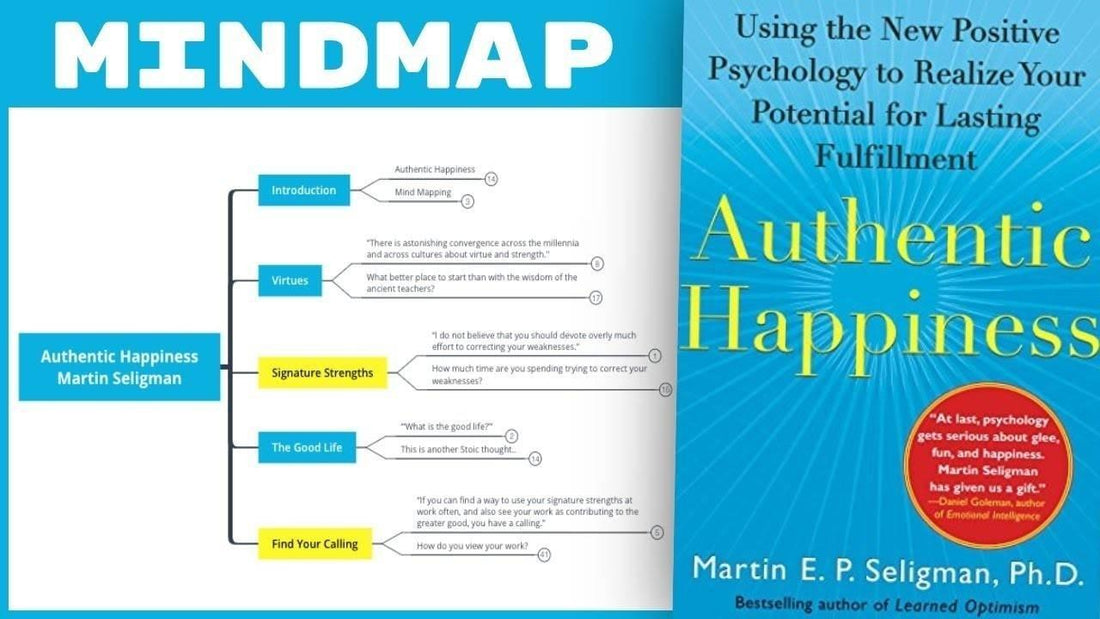Video Book Summary
Download all of the Mind Maps here.
Book Summary Notes
Authentic Happiness
“Happiness and well-being are the desired outcomes of Positive Psychology.”
Martin Seligman was the former president of the American Psychological Foundation
- He is also the Founder of the Positive Psychology movement which impacts many of the personal development books written today..
- Before Martin wrote this book and founded the movement most of psychology was focused on mental illness..
- We didn't have much research behind what everyday people can do to make their lives a better!
As Martin points out above Happiness and Well-Being are our desired outcomes here today..
- Today we're going to focus on things like:
- Core Virtues and how to live up to them
- Finding your Strengths and using them
- How to move from 'Job' to 'Calling'
Before we get started..
- I recommend you head over to Martins website
- AuthenticHappiness.org
- Take his strengths test! We're going to use it later.
Virtues
“There is astonishing convergence across the millennia and across cultures about virtue and strength."
"Confucius, Aristotle, Aquinas, the Bushido samurai code, the Bhagavad-Gita, and other venerable traditions disagree on the details, but all of these codes include six core virtues:
• Wisdom and knowledge
• Courage
• Love and humanity
• Justice
• Temperance
• Spirituality and transcendence
"Convergence across thousands of years and among unrelated philosophical traditions is remarkable and Positive Psychology takes this cross-cultural agreement as its guide.”
What better place to start than with the wisdom of the ancient teachers?
Some of you may know that I am really fascinated with Stoicism..
- I don't think that it's a coincidence here that Martin and 'positive psychology' have started with 6 core virtues that are essentially mirrored in Stoicism!
- Many of these ancient texts are very wise and deep even before science came to the party..
But starting from these six core virtues Martin and team developed 24 different character strengths!
- These are what you get when you take his test online..
- (Go and do that if you haven't already it's worth the 5 minutes).
The 'Character Strengths' that we are the strongest in are revealed in that test..
- Often times you will be able to guess what your character strengths are.. But this test is a good way of visualizing it!
- These strengths are extremely important because as Martin says using our strengths regularly in our everyday lives increases happiness and well being.
One of my coaching clients had ALWAYS struggled with sticking to something for a long period of time..
- (Maybe that wasn't one of his character strengths).
- When I took him through this test what we found was he wasn't living in congruence with his strengths!
- Instead he was trying to live up to the strengths he thought an entrepreneur needed..
- Business after business he started was successful but then he often got bored and they suffered..
What does that tell us? Well he wasn't playing on his strengths most likely..
He didn't have a deep sense of who he was, what he was good at and what he could contribute to the world!
By getting a little clarity on that he was able to transition some of the business building skills he had learned into a business where he was able to be creative and was rewarded for it!
Signature Strengths
“I do not believe that you should devote overly much effort to correcting your weaknesses."
"Rather, I believe that the highest success in living and the deepest emotional satisfaction comes from building and using your signature strengths.”
How much time are you spending trying to correct your weaknesses?
For most of us we know what we're bad at..
- I also think we don't choose to do things we're bad at on purpose!
- But quite often we don't choose to not do things we're bad at on purpose either..
- The real power here is knowing your strengths AND choosing to use them to help you make decisions..
Need more evidence?
- Research has shown that the more successful people are not those with the highest IQ's or GPA's.
- Rather it's the people who know who they are and what they are good at.. Then choose to do those things!
- Spending just enough time to make sure their weaknesses don't come back to bite them.
Going forward this Map is going to focus on helping you get a clearer view on what your strengths are and how you can use them in your life!
What are your five greatest strengths? (Now is a good time to download the map to follow along).
- 1.
- 2.
- 3.
- 4.
- 5.
The Good Life
“‘What is the good life?’"
"In my view, you can find it by following a startlingly simple path. The ‘pleasant life’ might be had by drinking champagne and driving a Porsche, but not the good life."
"Rather, the good life is using your signature strengths every day to produce authentic happiness and abundant gratification.”
This is another Stoic thought..
The good life isn't what we're sold in TV commercials..
- It's not about the car you drive, the house you have or the watch on your wrist!
- The good life isn't about anything external.. It's about the development of self.
Where does the development of self start?
- Step One: Finding our signature strengths.
- Step Two: Use those strengths everyday.
- Step Three: Find ways those strengths can help others.
Want to know my strengths?
- 1. Perspective and wisdom.
- 2. Creativity, originality and ingenuity.
- 3. Open mindedness, judgement and critical thinking.
- 4. Gratitude.
- 5. Leadership.
- Think I'm using them? I transitioned my business to use ALL of these strengths.. For decades to come I will be doubling down on these things! That is how important they are.
Find Your Calling
“If you can find a way to use your signature strengths at work often, and also see your work as contributing to the greater good, you have a calling.”
“Three kinds of ‘work orientation’: a job, a career, and a calling.”
Job: Punch the clock for a paycheck.
Career: Enjoy the benefits of advancement.
Calling: Passionate commitment to work.
“Any job can become a calling, and any calling can become a job. “A physician who views the work as a Job and is simply interested in making a good income does not have a Calling, while a garbage collector who sees the work as making the world a cleaner, healthier place could have a Calling.”
How do you view your work?
For most of my coaching clients this distinction between Job, Career and Calling is illuminating..
- Most of them have been frustrated by what they do for work for a long time..
- A lot of them see me as an entrepreneur and someone who can show them how to escape..
But here is the secret! Most of them don't 'need' to start a business.. In fact most of them just need to better understand their strengths!
So the below exercise is a good way to go about identifying your strengths and turning that Job into a Calling!
Quick note here.. a lot of my clients do start businesses when working with me!
This isn't because 'business' is what is going to make them happier and more fulfilled..
It's simply that sometimes.. Creative people with certain strengths are well suited for business. Business allows them to play to their strengths.
Here is the exercise:
Step One: List all 5 of your strengths.
Yours:
1.
2.
3.
4.
5.
Mine:
1. Perspective and wisdom.
2. Creativity, originality and ingenuity.
3. Open mindedness, judgement and critical thinking.
4. Gratitude.
5. Leadership.
Step Two: Identify how you would use them in everyday life (in an ideal world).
Yours:
1.
2.
3.
4.
5.
Mine:
Everyday I read, create Mind Maps and present so that I can share my perspective and wisdom with all of you.
Everyday I use my creativity, originality and ingenuity in my business. Creating new products, services and offerings to help better service my customers.
Business is an ever-changing field and everyday I use my open mindedness, judgement and critical thinking to best determine the way forward from every possible angle.
I have been wonderfully blessed to have amazing mentors, friends and coaching clients. By showing them my gratitude I play to my strengths and also grow my business.
Leadership is a skill I use everyday with coaching clients. Having the ability to lead without being attached to an outcome is the single most important skill for coaches.
Step Three: Look at how you can get there!
- Can you find ways to use your strengths in your current job? Great!
- Do you need to change careers or industries? Great!
- Would starting a business be a good way to play to your strengths? Great!
- Find what will work for you.

